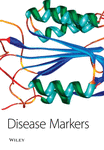Corticotrophin-Releasing Hormone Type 1 Receptor Gene (CRHR1) Variants Predict Posttraumatic Stress Disorder Onset and Course in Pediatric Injury Patients
Abstract
Posttraumatic stress disorder (PTSD) is a common and disabling anxiety disorder that may occur in the aftermath of exposure to potentially traumatic life events. PTSD is moderately heritable, but few specific molecular variants accounting for this heritability have been identified. Genes regulating the hypothalamic-pituitary-adrenal (HPA) axis, such as corticotrophin-releasing hormone type 1 receptor gene (CRHR1), have been implicated in traumatic-stress related phenotypes but have yet to be studied in relation to PTSD. The present study sought to examine the relation between 9 single nucleotide polymorphisms (SNPs) in the CRHR1 gene and posttraumatic stress symptoms in a prospective study of pediatric injury patients (n = 103) who were first assessed in the acute aftermath of their injury at the hospital. Results indicated that multiple SNPs were associated with acute symptoms at a univariate level, and after correction for multiple testing, rs12944712 was significantly related to acute PTSD symptoms. Longitudinal latent growth curve analyses suggest that rs12944712 is also related to both acute symptom level and trajectory of symptoms over time. The present study adds support for the role of CRHR1 in the stress response following potentially traumatic event exposure in youth. It should be noted that the sample size in this study was small, and therefore statistical power was low; following, results from this study should be considered preliminary. Although results are not definitive, the findings from this study warrant future replication studies on how variation in this gene relates to response to traumatic event exposure in youth.




